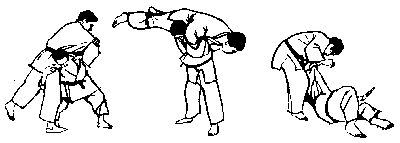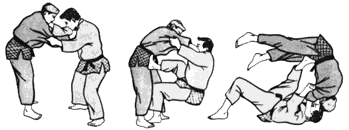|  | Before and after practicing Judo or engaging in a match, opponents bow to each other. Bowing is an expression of gratitude and respect. In effect, you are thanking your opponent for giving you the opportunity to improve your technique.
…..Dr. Jigoro Kano |
At the moment the body loses balance and the center of gravity is lost, all action is made impossible, for all our forceful actions are possible only in a stabilized posture. Therefore, if a contestant unbalances the opponent’s posture at the instant the latter is about to start an attack, he can make it ineffectual and thus defend himself. Again, the ultimate result of breadking balance is to throw the opponent and hold him, and, thus getting him under control, to make the state of unbalance pemanent and conclusive. In short, breaking balance, throwing and holding form the technical system of Judo. — Kenji Tomiki  We can say that Judo is an art because it is a method of arriving at self-realization and true self-expression. We can further say that Judo is a science because it implies mastery of various laws of nature: gravity, friction, momentum, velocity, weight transmission, and unison of forces. In its most important phase, it constitutes a kind of higher logic developed through practice and the ascencion of the true personality: a realization of the spiritual self in the philosophic rather than the religious sense of the word. — Jiichi Watanabe and Lindy Avakian
 | Japanese proverbs go “You can’t catch the tiger’s cub unless you dare to step into its cave,” or “No venture and no gain,” or “Risk all and gain all.” With such an attitude and state of mind you should attack in a lightening swiftness the moment you think it a chance. Here comes a mind in perfect harmony with body and you can get the key to the divine secret.
In the course of development, there was once a period when Judo was simply an art to fell down the opponent and in another period more importance was attached to physical culture. But the purpose is to be true to the standard of human life and its significance so rich that no simple words can express its implication. In other words, there is a union of body and soul, containing spiritual and physical factors put together.
To be spiritual may be interpreted both ethically and religiously, but Judo spirit absolutely takes side with righteousness and is incompatible with injustice, so its technique necessarily follows this principle of morality. Now, righteousness means well-balanced, mental and physical, and injustice or unrighteousness implies things unbalanced. This is easily comprehended, so when the mind is consistent with this reason, your temper is serene and you can act extremely freely. Therefore, “Ju” or in other words “being not hampered by anything” is “to tolerate” or “to pacify,” then it is quite natural that anyone going astray or doing wrong should easily be subdued or tolerated by “Ju”.
It is a superficial idea that Judo is simply an individual matter, because it is played between only two people. Real Judo means manifistation of rationality and not mere feat of physical strength. Verily, Judo truth admits no unrighteousness and is only consistent with developing the world as a peaceful and beautiful human cooperative body.
This lofty spirit of Judo is in its pure and firm trait, for its principle can only be grasped by continual self-annihilating efforts and endeavor, or in other words, through continuous hard exercise in sweltering summer and rigorous cold winter. Judo training is attainable only by dint of endeavor, perserverance, and modesty besides physical exercise.
— Kyuzo Mifune
|
 Judo is the way to the most effective use of both physical and spiritual strength. By training you in attacks and defenses it refines your body and your soul and helps you make the spiritual essence of Judo a part of your very being. In this way you are able to perfect yourself and contribute something of value to the world. This is the final goal of Judo discipline. — Jigoro Kano  According to the philosophy of the Shingaku Michi, or Way of Divinity, most felicitously expounded many years ago by the late Dr. W. Imbrie in his “Handbook of English-Japanese Etymology”, all things are set in a certain environment. To live in harmony with that environment is to follow the michi or path. All things therefore have a michi to follow: it is the michi of the crow to caw, of the fish to swim, of the willow to be green; and with the exception of man all things follow their michi. Although man does not follow his michi he should do so: for man has a honshin, which is sometimes rendered “conscience,” though it means also “one’s right mind,” “one’s senses,” or “one’s heart,” etc., and to obey the honshin is to follow the michi. The source of man’s error is this: he mistakes the passing phenomena of the external world–the things he perceives through the senses–for the unseen reality, in other words, he mistakes the shadow for the substance. The farther man goes the more bewildered he becomes. The way back to the michi is said to be obedience to the honshin. But the honshin is not what it once was, and the wanderer is without a trustworthy guide. It can therefore be only all to the good if both Japanese and Western judoka try to live up to the teachings of the great founder of Judo in which he sought to graft upon the purely physical branch of the art that ethical concept capable of embracing the synonym of michi. — E.J. Harrison 
|








